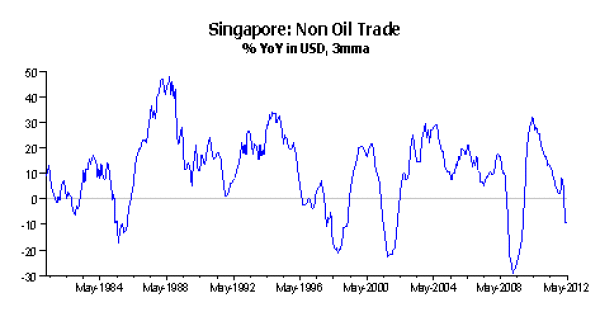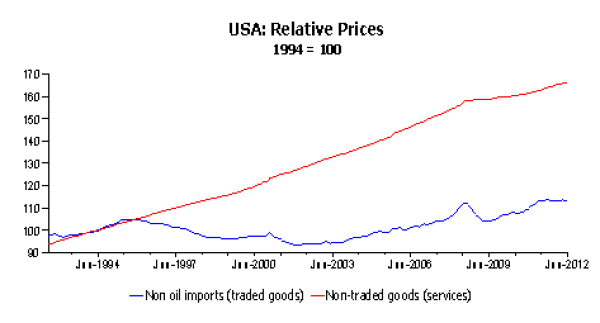Are we seeing the beginning of a new global recession?
Tyndall Monthly Commentary: In his monthly commentary London-based economist Andrew Hunt looks at the latest developments in the international markets and questions whether policy makers have got things right.
Tuesday, August 0th 2012, 6:00AM
by Andrew Hunt
It may seem to be a relatively small point but, over the last 12 months, the dollar value of Singapore's non-oil trade has declined by almost 10%. While the extent of this decline in Singapore's total trade has not yet been quite as great as that experienced during the Global Financial Crisis (GFC), the data is not that much better, either. For Singapore itself, this situation is clearly troubling given the huge proportion of the economy that is accounted for by trade flows but the rest of the world would do well to take notice of Singapore's problems. As one of the more open economies, Singapore can act as the proverbial "coal miners' canary" within the global economy and at present it seems not to be chirping very loudly....
In fact, over the years there have been a number of such useful canaries. Korean exports and business confidence have also produced a good track record of forecasting wider global economic trends. Currently, Korean export trends are on a par with those experienced during the near global recessions of the early 1980s and the early 1990s, although they are not yet as weak as those seen in the GFC and the early 2000s. Korean business confidence has also proved a useful indicator of global trade conditions and this has recently declined very sharply as well, as has China's trade data, although that is not an overly accurate data series.
In Europe, Belgium, by virtue of its geographical location, can often provide a leading indicator for the rest of the region and currently business confidence as well as production levels are falling into what in previous episodes have been regarded as deeply recessionary levels. Finally, the ECB's data on intra-regional trade is also beginning to suggest an ongoing contraction in nominal trade values that is at least on a par with that witnessed during the recession in the early 2000s.
More optimistically, the US's rate of nominal export growth is still positive at around 8% annualised but this is a notably slower rate than that witnessed six months ago. Overall, it would seem that if world trade is not in a recession, then it must be very close to it currently and the recent historical precedents suggest that the remainder of the world economy may not be too far behind it in this respect. Only three or four months ago, the financial markets apparently believed that the global economy was finally escaping from the legacies of the GFC but the global trade data suggests that, far from a recovery, there is a notable relapse in the system's health.
This weakness in the total trade data is very worrying in its own right but, over the last three months, many countries' import and export prices have evidently begun to deflate. Import prices for finished consumer goods into the USA have been flat year to date and may even be beginning to deflate at the margin. The US's import price data for Chinese goods has also fallen this year, despite China's continuing wage inflation problems and Hong Kong's various trade price indicators are suggesting slower rates of inflation or outright deflation with regard to Chinese re-export prices. Japan and Korea, meanwhile, are both reporting export price deflation in contract currency terms and Japan in particular seems to be suffering from a decline in the USD-denominated level of its aggregate export prices. There appears to not only be weak export trends but also an ongoing deflation in world trade prices that now extends well beyond just the commodities sectors. This would seem to be a particularly important - if not terribly positive - development.
One of our continuing "biggest themes" over the last 15 years or so has been the almost unprecedented gap that emerged during the late 1990s and early 2000s' massive credit boom between the level of non-traded goods prices in many Western economies and the level of traded goods prices. Since the majority of any domestic producer's costs within a country are dominated by non-traded goods prices such as land and labour, the fact that non-traded goods prices in the West were rising relative to traded prices implied falling profit margins, employment and incentives to invest in the traded goods industries, many of which were formerly the large employers of semi-skilled labour in these economies.

We regard the current travails of many Western labour markets and even the high levels of income inequality that persist as, in part, stemming from this decline in employment in the once-key traded goods sectors and the countries' inability to find suitable replacement sources of employment growth. We have therefore argued that for the West to make a sustainable recovery from its current weak position, then either we need domestic non-traded goods prices to fall back relative to traded goods prices (whether through non-traded goods prices deflating and/or traded goods prices rising), or alternatively for Western countries to retrain their workforces and to re-invent themselves through supply-side reforms. Unfortunately, there are relatively few signs that the latter is occurring.
If, though, world trade prices are now falling once again at a time in which we need them to rise relative to non-traded goods prices, then this implies that non-traded goods prices must not only fall as well, but that they must fall at a substantially faster rate than world trade prices. Hence, we are not surprised to see new or yet more weakness in many property markets around the world and an increasing threat of deflation within the world economy. If world trade prices cannot inflate, then non-traded goods prices will now try to deflate in order to return the global economy to some form of price equilibrium but the process of deflation in inflexible highly indebted economies is never likely to be a pleasant experience. We therefore fear for the global economic outlook that, at the moment, looks to be defaulting towards some form of potentially deflationary recession.
In summary, it seems that although the US consumer has until recently at least been attempting to support the global economy via an increase in their borrowing this year, the weakness in Europe and the BRICs seems to be creating a deflation in world trade that risks driving the global economy back into a slump at a time in which global policymaking seems neither to have a strong leader nor any new ideas. Instead, we get promises from many existing policymakers (particularly at the ECB) that "we will do something soon...." .
We would like to see policymakers switch from their overriding desire to support aggregate demand through unsustainable fiscal stimuli (that now have to be funded by central banks) and to instead concentrate on improving the business environment by deregulating and removing red tape so that the real economies can grow their way out from under their debt burdens.
Such policies, though, can take up to a decade to work and this is usually too long for politicians to wait, with the result that once the latest recession becomes more visible, they will presumably hold another summit to launch another unsustainable "quick fix" that, while likely to cheer sharemarkets for a few weeks and perhaps corporate debt markets for some time longer, they will, in all probability, fail to solve the underlying problems.
Against such a background, the conventional Western sharemarkets and even many of the emerging markets seem likely to provide trading opportunities and investors may therefore have to look to a variety of alternative forms of savings instruments to generate long-term wealth. Property, private equity and small companies may yet be able to provide some "alpha" if investments are well-executed but for the investment world in general, the overall climate is not improving.
Andrew Hunt, International Economist, London
Andrew Hunt International Economist London
| « Harbour commentary: Europe: A Step Back from the Brink | Harbour: Believe me, it will be enough » |
Special Offers
Comments from our readers
No comments yet
Sign In to add your comment
| Printable version | Email to a friend |









